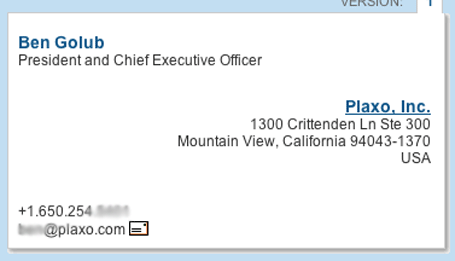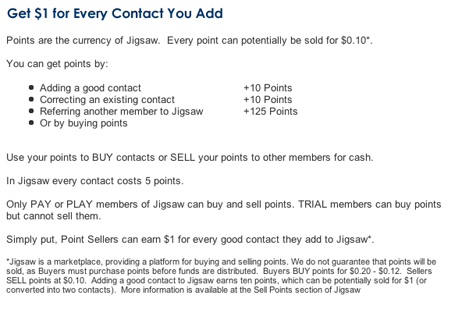Well, just as soon as one company stopped being evil, another one has stepped in to take its place. Jigsaw is a marketplace for contact information, and it is very efficient. It boasts detailed personal contact information for 2.5 million people, and 7,000 new people are added every day. If you want the name, title, email address, direct phone line and/or address of any executive of any company, there is a very good chance Jigsaw will already have it in its database and will sell it to you. And if you are a sales guy and have no ethical concerns about where you get your contact information, you probably already know all about Jigsaw.
Unlike competitors like Hoovers and InfoUSA, which gather company information by semi-legitimate means such as scouring SEC filings, cold calling companies and asking for information, and reviewing other public documents, Jigsaw simply pays people to upload other people’s contact information. Users are paid $1 for every contact they upload, and some users have uploaded information on tens of thousands of people. See the demo (and note the other demos on that page as well). Jigsaw is also self correcting, and incentivizes people to also correct bad contact information.
That’s right, the next time you hand out a business card to someone or otherwise divulge your contact information, you may be handing it out to the entire world.
Here’s how it works: Sign up and start downloading contact information. This includes name, title, company, address, email and direct phone line. For example, a quick search brought up all of this personal contact information for Ben Golub, CEO of Plaxo (appropriately smudged):

But wait, it gets much worse.
Anyone can find out if Jigsaw has their contact information via a link on the home page, but amending or trying to delete that information simply puts a flag on the data with the changes noted – but the original information also remains.There appears to be no way to remove your own contact information from Jigsaw once someone has entered it into their database. There is no method that I was able to find on the website to do this (including in the privacy policy), and an email to the company asking about this went unanswered (its been three business days now).
Jigsaw has a carefully worded privacy policy to deal with the fact that they are the antithesis of privacy. They say “This privacy policy covers how, when and why we collect, use and share information about our users…This policy does not apply to our collection and use of data about companies and contacts contained in our database system.”
Is Jigsaw legal? Maybe in the U.S., although I’d love to see a class action case brought against them. Is it ethical? Absolutely not. Every Jigsaw employee and investor has dirty hands and they should be ashamed of themselves.
Like Plaxo, Jigsaw makes money while pushing costs to other people. In Plaxo’s case, its spam. In Jigsaw’s case, its making private contact information public. The problem here is that Jigsaw’s actions aren’t easily found out by people getting constant cold calls and emails – it’s very unlikely they’ll know that these people got this contact information at Jigsaw in the first place.
If they wanted to do this right, they’d set up a marketplace where individuals could choose to sell (or give away) their contact information. The owner of the data could set the price, and Jigsaw could take a cut. Would this model work? Perhaps not, but that just proves my point. The only reason Jigsaw does work is because they don’t have to bear the costs that they push to third parties – all of the people who are in their database.
Management team and investors are here.

UPDATE: Rafe Needleman emailed to point to an article he wrote about Jigsaw in late 2004. He calls it “clever but creepy” and says “I don’t approve of Jigsaw’s ethical position”. I agree.